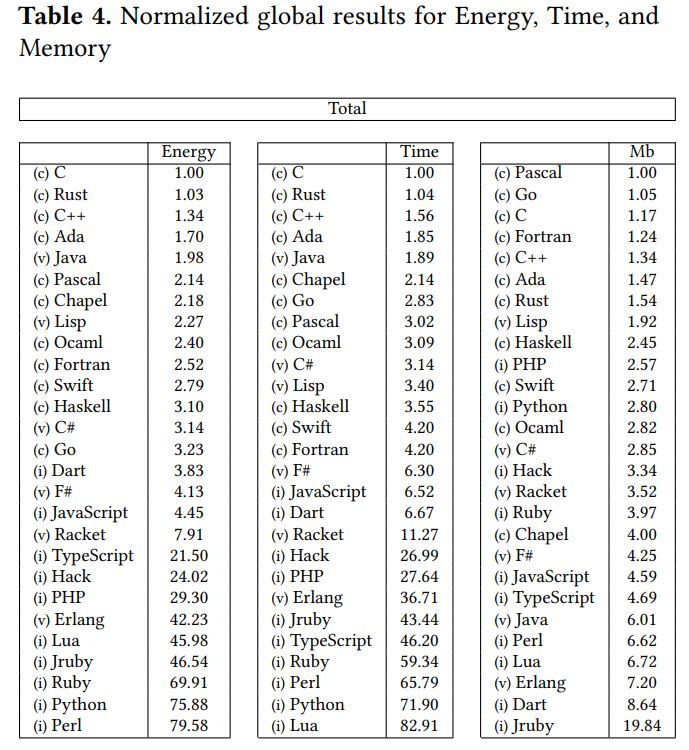
The Most Efficient and Environment Friendly Programming Languages
Choosing a programming language is a challenging task. What matters is not only whether the developers learn it quickly, but also what they can code in it and whether it is developed. Although until now, the main focus has been primarily on creating fast programs, and performance in software languages has, in almost all cases, been synonymous with fast execution time, today, it also matters energy consumption. Hence, the growing concern about the energy efficiency of computers forces an appropriate approach to programming. So, which of the currently available programming languages can be called the fastest and most energy efficient? This is what you will find out in the rest of the article.
Fastest and most energy efficient programming languages – what factors should be taken into account?
Java, Python, Go, JavaSript, and other programming languages differ in many ways. We are talking about their syntax, coding methods, efficiency, memory usage, and execution speed. Choosing a specific one for your custom development project depends on the goal you want to achieve. Some of today’s popular programming languages are designed to be fast and efficient. Others feature ease of use or versatility.
For example, compiled languages are perceived as faster than interpreted languages because the compiler compiles all the machine code at once while the interpreter verifies the program line by line and converts it to machine code. This action, therefore, delays execution time.
Besides, some frequently used programming languages are prone to various errors. For example, PHP may exhibit inter-site scripting errors, and Python may have problems with input validation. To deal with errors, some compilers have been equipped with additional security features, which affect the speed of programming languages.
So which is the fastest and most energy efficient programming language? Let’s take a closer look at the capabilities of Java, JavaScript, Python, Ruby, PHP, and Go.
[Read also: Introduction to Mojo Programming Language: The New Generation of AI Development]

[Read also: Legacy Software Systems: How to Live with Aging Software Architecture?]
Which one is the most efficient programming language?
Do you know what programming language Facebook, Netflix, Twitter, WhatsApp, Airbnb, or LinkedIn are written in? Programming languages differ in their applicability, performance, speed, or power consumption. C language, for example, is widely considered the most efficient language, while Python is almost at the bottom of the list.
How about Java?
Java is one of the most popular programming language. It is a general-purpose, object-oriented, interpreted language. Its author is James Gosling of Sun Microsystems. During the development of this programming language, he focused on its functionality. However, it must be admitted that he did the task perfectly, as Java is known as – write once, run anywhere.
Java code is compiled into bytecode and, in this form, is executed by a virtual machine. Equally importantly, Java programming language is architecture-independent, meaning it can be run on any device as long as it has a Java virtual machine. This is because the source code is compiled into intermediate code, which is then interpreted by the Java virtual machine. To ensure adequate performance, so-called JIT (Just In Time) compilers are used.
Java is used in many applications – from Android applications, web applications, the banking technology, big data, information technology, retail and stock markets, and the scientific community. If you want to know how to Improve Java performance and how to build low latency Java applications, please visit our blog!
[Read also: The Most Common Problems in Software Development]

Although compiled languages such as C and C++ are the leaders in the tests and are expected to be the fastest and most energy-efficient, Java is one of the fastest and most energy-efficient object-oriented programming languages, according to an analysis by The Computer Language Benchmarks Game. Widely popular but Interpreted languages like Python and Ruby are placed significantly lower.
It’s also important, that although the most energy-efficient language in any benchmark is almost always the fastest, the fact is that no language is consistently better than others. This allows us to conclude that the situation in which a particular programming language is used is a crucial aspect for determining whether that language is the most energy-efficient option.
[Read also: Application Development Guide: Types of Applications and Development Methodologies]

Are energy efficient languages are the greenest ones?
It is essential to know that comparing software languages is a complicated and complex process. This is because performance is affected by the compiler, virtual machine, available libraries, or garbage collector. A program written in a given language can become faster through improvements to the source code or optimizing libraries or the compiler. Learn more about the example of Java from our article how is Java used in software development.
A common misconception when analyzing energy consumption in software is that it changes as much as the execution time. That is, it is assumed that a reduction in program execution time will result in the same reduction in energy. However, this is not entirely true, as energy is not consumed at a constant rate.
The compiled languages proved the fastest and most energy-efficient during the analysis presented in the report Energy Efficiency across Programming Languages – How Do Energy, Time, and Memory Relate.
On average, the compiled languages consumed 120J to execute solutions, while for virtual machine languages and interpreted languages, the value was 576J and 2365J, respectively.
This trend can also be observed in the case of execution time, as compiled languages required 5103ms, virtual machine languages 20623ms, and interpreted languages 87614ms (on average).
According to the research mentioned above, the leading list in energy efficient languages is C, Rust, C++, Ada. Java was ranked next. Analyzing the potential of Java vs. Ruby, Python, JavaScript, Go or PHP in this context is very promising. Other common programming languages were also included in the list, but in more distant places – Go ranked 14th, JavaScript 17th, PHP 21st, and Ruby and Python ranked 25th and 26th, respectively.
[Read also: How to Choose a Software Development Company – CHECKLIST]

Source: Energy Efficiency across Programming Languages, SLE’17
Energy efficiency in green coding
The amount of energy required to power the data centers needed to host various types of services is growing every year. Therefore, improving energy efficiency is gaining importance, especially since, according to market data, maintaining data centers consumes as much as 1-1.5% of global electricity consumption.
Green coding, i.e., writing programming code that minimizes the energy consumption of software, thus reducing the negative impact on the environment, can help. In addition, green coding practices encourage software developers to apply lean coding principles, where great emphasis is placed on minimal processing, to achieve similar results. In this context, choosing energy efficient languages that can significantly minimize energy consumption is crucial. Learn about other software development trends and about the future of software engineering.
Green coding principles should be considered in accordance with a company’s existing practices. In addition, they should be incorporated into software engineering principles, which should always be considered when writing code for new applications or web services to balance equate energy efficiency, functionality, and energy consumption.
At Stratoflow, we place a very high emphasis on creating high-performance Java applications, and we also care about low latency, not only when building computing processes but for any digital products. For this reason, the topic of the fastest and most energy efficient programming languages is critical to us.
Related Posts
- How to Build an Inventory Management System: Key Steps and Tips
- How to Build a Document Management System: Alternative Approach
- Online Shopping Recommendations – Introducing Them to Your Business
- Amazon Product Recommendation System: How Does Amazon Algorithm Work?
- Movie Recommendation Systems: A Business Guide
We are Stratoflow, a custom software development company. We firmly believe that software craftsmanship, collaboration and effective communication is key in delivering complex software projects. This allows us to build advanced high-performance Java applications capable of processing vast amounts of data in a short time. We also provide our clients with an option to outsource and hire Java developers to extend their teams with experienced professionals. As a result, the solutions designed for our customers contribute to their business development. We specialize in travel software, ecommerce software, and fintech software development. In addition, we are taking low-code to a new level with our Open-Source Low-Code Platform.